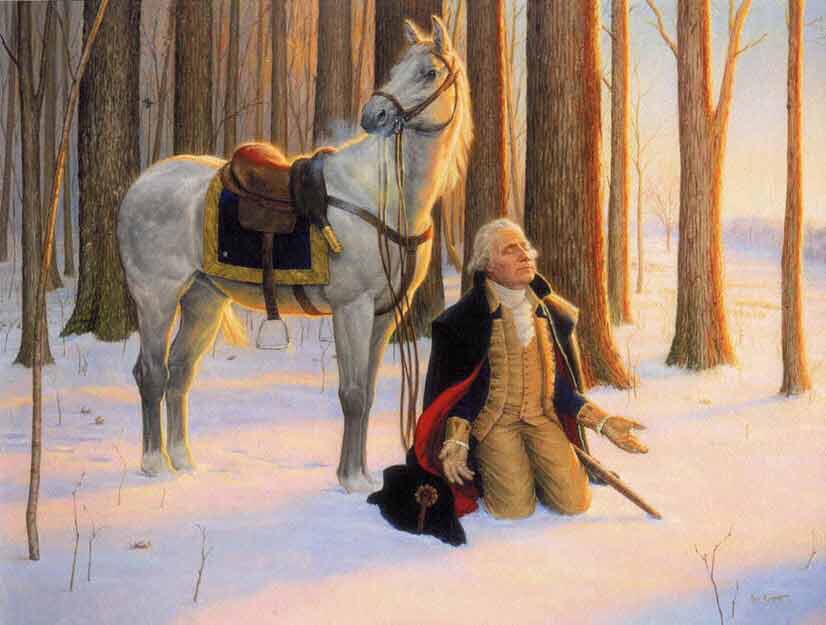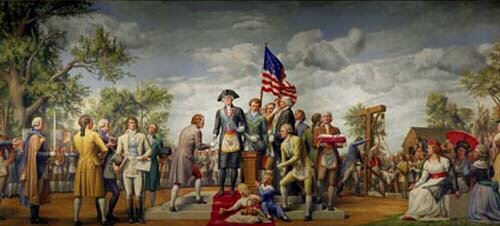孫中山與華盛頓的祈禱與見證
US Choral Society-104255 07/21 5972

George Washington Prays, God Sends Supernatural Fog to Allow Escape
一场神秘的大雾,挽救了美国革命,让华盛顿的部队安全地撤离了英军的包围圈。简直是神迹,诸葛亮用兵也不过如此。
When the war for independence began, Washington was selected as General of the Army of the United States. The day after he took charge he issued orders requiring: 'All officers and soldiers not engaged in actual duty to attend Divine Services to implore blessings of heaven upon the means used for their safety and defense.'
Shortly after the signing of the Declaration of Independence, the blessing of heaven and Providential protection of God were manifested upon the Colonial Army.
During fighting on Long Island, British General Howe and his 32,000 well trained troops had inflicted heavy losses on Washington's army but had not succeeded in capturing or destroying it. General Howe then prepared to attack the 8,000 American troops on Brooklyn Heights. The British Army had Washington's army surrounded in a great semi-circle with their backs to the mile wide East River.
Here we see the first amazing event, for General Howe remained in this position for two days and did not attack. Had he attacked, victory would have been certain for the superior British force. It is not known even to this day why he delayed. Washington, greatly outnumbered, realized to fight would mean defeat and the likely end of the war. Surrender was unthinkable! To retreat was the only thing to do. But how?
The British completely blocked any route on land which left only the wide East River. The American Army could have easily been surrounded by the British but Providential adverse weather conditions kept British ships from sailing up the East River.
As a result the American Army was able to make an attempt to escape. To make sure the British did not discover their retreat, Washington set out to evacuate his army in great secrecy. He set orders for every rowboat, sailboat and seagoing vessel to be collected in the area. At 8:00 pm on the night of August 29, 1776 the evacuation of the troops commenced. Heavy rain was falling as the evacuation began and the adverse winds which hindered the British ships continued. In this weather, the sailboats were of little use and only few rowboats were employed in the retreat. At this rate, evacuation seemed impossible.
But at 11:00 pm the Northeast wind which had raged for three days amazingly stopped and the water became so calm that the boats could be loaded with extra weight. A gentle breeze arose from the South and Southwest which favored their travel across the river to New York.
The retreat continued throughout the darkness of the pre-dawn. But as the sun began to rise, many troops were yet to be evacuated. Their death seemed apparent. But again, an astonishing thing occurred. Major Benjamin Talmage was still on the island and he recorded what happened in his memoirs: "After dawn of the next day approached, those of us who remained in the trenches became very anxious for our own safety and when the dawn appeared there were several regiments here on duty.
At this time, a very dense fog began to rise out of the ground and off the river. It seemed to settle in a peculiar manner over both encampments. I recollect this peculiar Providential occurrence perfectly well. And so very dense was the atmosphere that I could scarcely discern a man six yards distance. We tarried until the sun had risen but the fog remained as dense as ever." The fog remained until the last boats left Long Island.
Another miraculous event occurring during this retreat was recorded by Washington Irving in his 'Life of Washington'. Near the ferry, where the troops were being evacuated, a family lived who favored the British cause. Upon seeing the army's embarkation, the lady of the house sent a servant to warn the British of what was happening. The servant managed to slip past the American guards but upon reaching the British lines he ran into an outpost of German speaking soldiers (Hessians) and was unable to communicate with them. The servant was put under guard at the outpost as a suspicious person until early in the morning when a British officer examined him.
Upon hearing the story, some soldiers were sent to validate it. They cautiously approached the American Camp only to find it completely empty. Had the servant ran into anybody else, the British would have been able to surprise the American Forces in the midst of their retreat. British troops were hurriedly dispatched to the river. When they arrived, the fog had lifted enough for them to see four boats upon the East river. The only boat close enough to be captured contained three vagabonds who stayed behind to plunder. Otherwise, thousands of men, with nearly all of their supplies had miraculously retreated to New York.
Here we see the American General Greene say: 'The best effective retreat I ever read or heard of!' This event was so astonishing that surely the explanation given by many of the Colonists was true: 'That God was defending the cause of liberty.' The Colonists continued to pray and rely upon God throughout the war.
During the harsh winter of 1777 to 1778 when the American troops were suffering at Valley Forge, Washington could often be found upon his knees within the woods laying the cause of his bleeding country at the throne of grace.
In the prayer room of the Capitol, we can see in the stained glass window the kneeling figure of George Washington. Behind him, a prayer from the first verse of Psalm sixteen is etched: 'Preserve me Oh Lord, for in Thee do I put my trust.' Washington was observed by his troops, his officers, and various civilians to regularly pray in his tent as well as in secluded groves.


